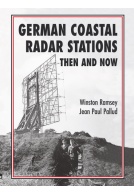First Manned Rocket Launch (Hardback)
Then and Now
By
Jean Paul Pallud
Imprint: After the Battle
Pages: 88
Illustrations: 160 mono illustrations
ISBN: 9781036101282
Published: 6th August 2024
Imprint: After the Battle
Pages: 88
Illustrations: 160 mono illustrations
ISBN: 9781036101282
Published: 6th August 2024
You'll be £20.00 closer to your next £10.00 credit when you purchase First Manned Rocket Launch. What's this?
+£4.99 UK Delivery or free UK delivery if order is over £40
(click here for international delivery rates)
Order within the next 2 hours, 12 minutes to get your order processed the next working day!
Need a currency converter? Check XE.com for live rates
(click here for international delivery rates)
Order within the next 2 hours, 12 minutes to get your order processed the next working day!
Need a currency converter? Check XE.com for live rates
| Other formats available - Buy the Hardback and get the eBook for £1.99! | Price |
|---|---|
| First Manned Rocket Launch ePub (68.5 MB) Add to Basket | £12.99 |
Well before Yuri Gagarin or Alan Shepard, Lothar Sieber became the first man to take off vertically from the ground under rocket power on March 1, 1945. The plane crashed after flying for 55 seconds and he was killed. The launch marked a milestone on the road to spaceflight, even though it remained virtually unknown to the general public for more than half a century.
But the Natter was a weapon of war born out in the closing months of World War II when Germany was desperately looking for 'wonder weapons' to fight the inevitable defeat.
A vertical take-off rocket fighter, the Natter would reach the Allied bomber altitude in seconds, then the pilot would get within firing distance of a bomber, and fire all 24 rockets into the nose in a single shot. Its fuel running out, the pilot will then glide the plane at high speed to a lower altitude, at which point he will trigger the plane to break up, a large parachute opening at the rear, popping off the nose and the pilot with it. The pilot and the tail with the Walter rocket engine would land under their separate parachutes, while the disposable nose, fuselage and wings were to crash to the ground.
The Natter is unquestionably an exciting aircraft but it is safe to assume that it would have been a failure as a bomber interceptor.
“…provides a quick reference for historians and modelers.”
IPMS/USA
Read the full review here
“This is a very nice reference book that contains a well written informative text, subject specific photographs, well detailed captions and more, all detailing Erich Bachem's Ba 349 Natter…”
Aeroscale
Read the full review here
"This is a fascinating story from the final months of the war which has now been updated into this high quality publication."
HistoryBookChat
Read the full review here
For the WW2 aviation historian, and the modeller, there is so much detail in here for you.
Military Model Scene
Read the Full Review Here
More titles by Jean Paul Pallud
Other titles in After the Battle...




















